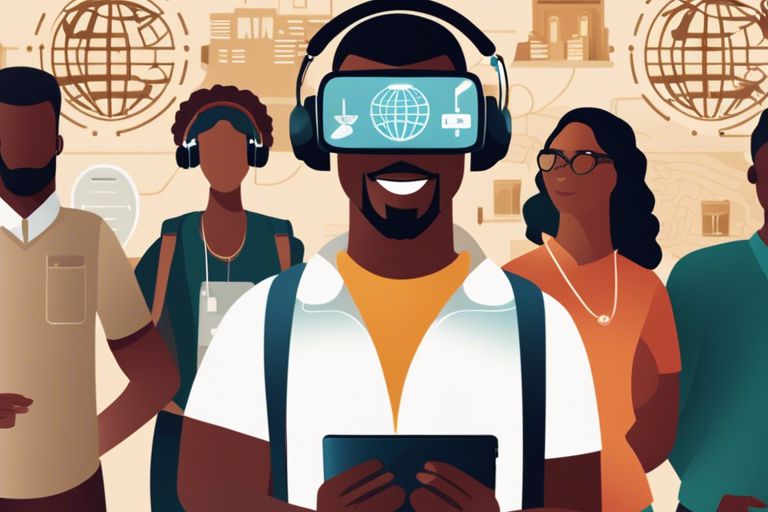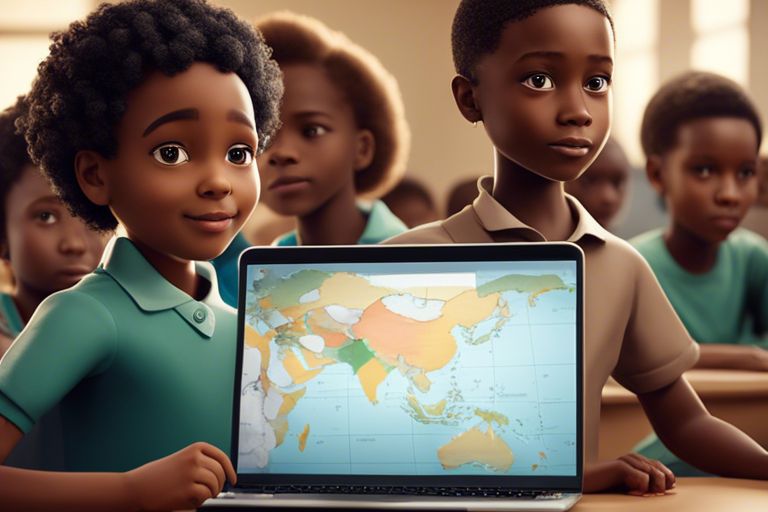It’s no secret that technology is rapidly transforming the way we live, work, and learn. In education, artificial intelligence (AI) is playing a crucial role in reshaping traditional teaching methods, particularly in African countries. With the help of AI, personalized learning experiences are becoming more accessible and effective, offering students a tailored education that meets their individual needs and abilities.

Key Takeaways:
- AI can personalize learning: Artificial Intelligence (AI) can tailor education to the individual needs of students, offering personalized learning experiences.
- Improves learning outcomes: Utilizing AI in African education systems can lead to improved learning outcomes, ensuring each student reaches their full potential.
- Overcoming resource limitations: AI can help overcome resource limitations by providing access to quality education and educational materials for all students.
- Enhancing teacher effectiveness: AI can support teachers by providing data-driven insights to help them understand student performance and adapt their teaching methods accordingly.
- Addressing individual challenges: AI can identify and address the individual challenges that students face, offering targeted interventions to support their learning.
- Promoting inclusivity: AI can promote inclusivity by catering to diverse learning needs and styles, ensuring that all students have equal opportunities to succeed.
- Continuous improvement: AI in education systems allows for continuous improvement by collecting and analyzing data to refine personalized learning approaches over time.
The Landscape of African Education
Some of the most pressing issues facing education in Africa are rooted in the diverse educational needs across the continent. With 54 countries, over 2000 languages spoken, and a wide range of cultural and socioeconomic backgrounds, the educational landscape in Africa is incredibly varied.
Diverse Educational Needs Across the Continent
Educational systems in Africa must cater to a wide spectrum of needs, from urban to rural settings, different language requirements, and varying levels of infrastructure and resources. These factors make it challenging to implement a one-size-fits-all approach to education and necessitate a more tailored and localized strategy.
Current Challenges in the African Educational Systems
One of the significant challenges facing African educational systems is the lack of access to quality education for many children. This is often exacerbated by insufficient funding, inadequate teacher training, and a lack of suitable learning materials. These issues contribute to low literacy rates and hinder the overall development of the continent.
Current efforts are being made to address these challenges, including implementing technology-based solutions, training more educators, and improving infrastructure. However, these initiatives require significant investment and collaboration among governments, organizations, and communities to make a meaningful impact on the educational landscape in Africa.
Fundamentals of Artificial Intelligence
Understanding AI and Its Capabilities
Intelligence is at the core of Artificial Intelligence (AI), which enables machines to learn from data, adapt to new inputs, and perform human-like tasks. AI systems analyze patterns in data to make informed decisions, recognize speech, translate languages, and even drive autonomous vehicles. These capabilities are powered by algorithms that process vast amounts of data to improve accuracy and efficiency over time.
AI Technologies Relevant to Education
On the forefront of revolutionizing education, AI technologies offer personalized learning experiences, adaptive assessments, and intelligent tutoring systems. These tools leverage data analytics to understand how students learn best, identify areas of improvement, and provide tailored support. By incorporating machine learning and natural language processing, AI enhances educational content delivery and facilitates interactive learning experiences.
This signifies a shift towards more personalized and effective learning approaches, catering to individual student needs and improving overall education outcomes. AI technologies have the potential to transform traditional education systems by enhancing teaching methods, empowering educators, and engaging students in meaningful ways.

Personalization in Education Through AI
Not long ago, the idea of harnessing Artificial Intelligence (AI) to revolutionize education in Africa seemed like a distant dream. However, as highlighted in the article “Revolutionizing Education in Africa: Harnessing AI for Learning”, we are now at a pivotal moment where AI is reshaping personalized education models in the region.
AI-Driven Adaptive Learning Platforms
AIDriven educational platforms are at the forefront of enhancing personalized learning experiences in Africa. These platforms utilize AI algorithms to analyze student data and behavior patterns, allowing for the creation of tailored learning paths. By continuously adapting content and pacing to suit individual student needs, these platforms facilitate more effective learning outcomes. Students gain access to personalized feedback, targeted resources, and dynamic assessments that cater to their unique learning styles.
Customizing Curriculum with AI Insights
Adaptive AI technologies provide educators with valuable insights into student performance and comprehension levels. With this data, teachers can customize curricula to better address the specific needs of each student. By identifying knowledge gaps and learning preferences, educators can create personalized lesson plans that optimize student engagement and academic growth. With AI-generated insights, educators can adopt a proactive approach to address individual learning challenges and nurture student success.

AI-Powered Educational Resource Optimization
Once again, the role of Artificial Intelligence in personalizing education cannot be overstated. As discussed in our earlier post on How Artificial Intelligence Can Be Used for Personalized Learning, AI has the potential to revolutionize educational systems by tailoring learning resources to the specific needs of each student.
Smart Allocation of Educational Resources
On the forefront of AI integration in education systems is the smart allocation of educational resources. With AI algorithms analyzing data on students’ learning patterns, strengths, and areas for improvement, educational institutions can optimize resource allocation. By identifying which learning materials are most effective for different types of learners, schools can ensure that each student receives the support they need to thrive academically.
Enhancing Teacher-Student Interactions with AI Tools
On the other hand, AI tools can also enhance teacher-student interactions by providing valuable insights and suggestions. Teachers can leverage AI-powered platforms to track student progress, identify struggling students, and offer personalized recommendations for improvement. By streamlining administrative tasks and providing real-time feedback, AI frees up educators to focus on meaningful interactions and individualized support for their students.
Resource optimization through AI is not about replacing teachers but empowering them with the right tools and information to make a greater impact on student learning outcomes. By harnessing the power of AI, teachers can identify areas where students need extra help, tailor their teaching strategies accordingly, and create a more engaging and effective learning environment.
Bridging the Achievement Gap
To Transforming Classrooms: The Growing Impact of Artificial Intelligence in African Education, it is crucial to address the achievement gap that exists in the education systems across the African continent. One key solution lies in identifying and supporting at-risk students to ensure no child is left behind. Through the use of AI technology, educators can analyze data to pinpoint students who may be struggling academically or are at risk of falling behind. By providing targeted support and interventions, these students can be given the assistance they need to succeed.
Identifying and Supporting At-Risk Students
To address the issue of at-risk students, AI algorithms can be utilized to track individual student performance and behavior patterns. By examining factors such as attendance, test scores, and engagement levels, educators can intervene early to provide personalized support. This proactive approach can help prevent students from slipping through the cracks and ensure that every child has the opportunity to reach their full potential.
Scaling Quality Education Across Regions
Supporting the scaling of quality education across regions in Africa is vital for the overall development and progress of the continent. By leveraging AI technology, educational resources and best practices can be shared and adapted to suit the needs of different communities. This can help bridge the gap between urban and rural areas, ensuring that all students have access to a high standard of education regardless of their location.
The implementation of AI in education can revolutionize the way learning is delivered, making it more accessible and inclusive. By supporting the scaling of quality education across regions, we can create a more equitable and effective education system that benefits all students in Africa.
Ethical and Practical Considerations
Data Privacy and Security in AI Applications
To ensure the successful integration of AI into personalized African education systems, it is imperative to prioritize data privacy and security. Sensitive student information is often collected and stored in AI applications, making it vital to implement robust security measures to protect this data from unauthorized access or breaches. Institutions must comply with data protection regulations and establish clear policies regarding data storage, access, and sharing to uphold confidentiality and prevent misuse.
Furthermore, transparency in how data is collected, used, and shared within AI systems is crucial for building trust among students, educators, and stakeholders. Educators must be informed about the types of data being collected and how it is being utilized to enhance the learning experience. By fostering a culture of data privacy and security, African education systems can harness the full potential of AI without compromising the trust and confidence of the community.
Ensuring Equitable Access to AI-Enhanced Education
Equitable access to AI-enhanced education is a fundamental principle that education systems in Africa must prioritize. By leveraging AI technologies, personalized learning experiences can be tailored to meet the diverse needs of students, regardless of their backgrounds or geographical locations. It is vital to bridge the digital divide by ensuring that all students have access to the necessary technological tools and infrastructure to benefit from AI applications.
Additionally, education stakeholders must address issues of bias and discrimination that may arise in AI algorithms used in educational settings. By conducting regular audits and assessments of AI systems, educators can identify and rectify any biases that could perpetuate inequalities in access to quality education. By promoting inclusivity and fairness in the deployment of AI technologies, African education systems can create a more level playing field for all learners.
Data privacy and security must be at the forefront of AI applications in education to protect sensitive student information. Institutions should implement robust security measures and clear policies to ensure data confidentiality and prevent misuse.
Implementing AI in African Education Systems
Pilot Programs and Incremental Adoption
Education systems in Africa can benefit greatly from the implementation of AI technologies. Pilot programs are a vital first step in introducing these technologies, allowing educators and administrators to assess their effectiveness in real-world scenarios. By gradually incorporating AI tools such as personalized learning platforms and intelligent tutoring systems, schools can incrementally adopt these technologies without overwhelming existing infrastructure.
Training and Development for AI-Readiness
Systems in place must prioritize training and development initiatives to ensure that all stakeholders are equipped with the necessary skills to leverage AI effectively in education. This includes providing educators with professional development opportunities to enhance their digital literacy and teaching abilities in a technologically advanced learning environment. Additionally, administrators and policymakers need to be knowledgeable about AI applications and regulations to make informed decisions on system-wide implementations.
The readiness of education systems for AI integration depends on comprehensive training programs that not only teach the technical aspects of AI but also emphasize its ethical and practical implications. This holistic approach ensures that AI is harnessed responsibly to enhance the quality of education in Africa.
To wrap up
Conclusively, the integration of AI in African education systems has the potential to revolutionize personalized learning for students across the continent. By leveraging AI technologies such as machine learning and natural language processing, educational platforms can cater to the diverse needs and learning styles of individual students. This approach not only enhances the quality of education but also fosters inclusivity and accessibility in learning environments.
As African countries continue to invest in digital technologies and embrace innovative solutions, the adoption of AI for personalized education is poised to make a significant impact on the future of the continent. By harnessing the power of AI tools, educators can create tailored learning experiences that empower students to reach their full potential and thrive in an ever-evolving global landscape.
FAQ
Q: What is AI for personalized African education systems?
A: AI for personalized African education systems refers to the use of artificial intelligence technologies to tailor educational content and teaching methods to the individual needs and preferences of students in African educational settings.
Q: How can AI enhance personalized learning in African education systems?
A: AI can enhance personalized learning in African education systems by analyzing data on students’ learning patterns, preferences, and performance to provide customized learning experiences, feedback, and support.
Q: What are the benefits of using AI for personalized education in Africa?
A: The benefits of using AI for personalized education in Africa include improved student engagement, better learning outcomes, increased retention rates, and more efficient use of resources.
Q: How does AI-powered adaptive learning work in African education systems?
A: AI-powered adaptive learning in African education systems involves using algorithms to continuously assess students’ progress and adjust the pace, difficulty, and content of learning materials to suit their individual needs.
Q: Are there any challenges in implementing AI for personalized education in African countries?
A: Yes, some challenges in implementing AI for personalized education in African countries include limited access to technology, inadequate training for teachers, concerns about data privacy, and ensuring equitable access for all students.
Q: How can AI support teachers in personalized African education systems?
A: AI can support teachers in personalized African education systems by automating administrative tasks, providing insights into student performance, offering recommendations for personalized interventions, and facilitating communication with students and parents.
Q: What is the future outlook for AI in personalized African education systems?
A: The future outlook for AI in personalized African education systems is promising, with continued advancements in technology, increased adoption of AI-driven solutions, and a growing emphasis on personalized learning to meet the diverse needs of students across the continent.